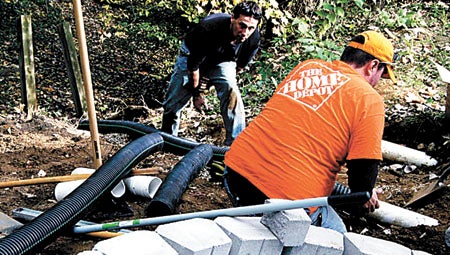Home Depot helps veterans
Published 6:26 pm Wednesday, October 10, 2012

Home Depot volunteers build a retaining wall alongside Niles’ transitional housing facility at 323 N. Lincoln Tuesday. Volunteers of America Michigan operates the six-month veterans independence program.
Fifteen Orange Home Depot shirts swarmed over the Niles transitional housing facility for 18 veterans at 323 N. Lincoln St. Tuesday, building a retaining wall, insulating the attic, installing carpet squares, planting landscaping and putting in a floodlight.
Volunteers of America Michigan (VOAM), the largest private provider of services to veterans and homeless veterans, operates the six-month Niles veterans independence program (VIP), along with facilities in Detroit and Lansing.
Home Depot Foundation purchased supplies for volunteers who came from as close by as Mishawaka and as far away as Flint.
Residents of the three-floor apartments with dormitory-style suites, include the first female veteran, a mother of three. She and her children faced eviction and were on the brink of homelessness before connecting with VOA.
“We look forward to seeing those orange shirts,” said Chris Schmidt, VOAM construction manager. “This work could not be accomplished without the Home Depot Foundation funding and sweat equity from the Team Depot employees.”
Home Depot Foundation is committed to insuring every veteran has a safe place to call home — not just through financial donations, but also through the dedication and hands-on service of store associates.
The second annual Celebration of Service initiative runs two months from Sept. 11 until Veterans Day.
“I traveled three hours this morning from Flint,” said Stacy Carlson. “I have two more projects in November with upwards of 100 volunteers. All associates are here on their own time, taking a day off work without pay. I’ve worked for Home Depot for 14 years. This is what attracted me to the company. I have five sons at home. I wanted to be where I could volunteer my time and be with a great group of people and help veterans who served their country.”
As a district manager, Carlson oversees eight stores. Her regional boss, Crystal Hanlon, has responsibility for 100 stores in Michigan and Indiana, and was at a project in Burton.
“We love what we do,” Carlson said, “and we’re lucky to be part of an organization that lets us do this, though it’s not easy work sometimes. When you do a project at home, you think, ‘I wish I had my team.’ ”
Site manager Dorian Mitchell from Saginaw is a 20 percent disabled veteran who graduated from Michigan State University.
Stationed in North Carolina and Maryland and deployed to Iraq and Syria, he appreciates the slower pace of Niles.
“Every client has a case/treatment plan. A lot of guys dealing with substance abuse lost everything and burned bridges with family and friends, so this is a last resort. I slept outside for four months on the border doing house raids. There was no running water. My shower was a bottle of water and baby wipes. When you come back stateside, you don’t have to do that anymore.”
VOA made ending veteran homelessness a strategic priority. In 2012, its veterans programs were awarded their second three-year accreditation by CARF, the Commission on Accreditation of Rehabilitation Facilities.
Its programs achieve Veterans Health Administration outcomes in all areas — mental health, substance abuse and physical health.
Seventy-seven percent of veterans who complete the Niles program move into independent housing.
In the past four years, VOAM has helped 210 veterans find employment.
Niles’ VIP is a first step in a continuum of veteran services. It can be a short-term fix for a disabled veteran who gets evicted. Veterans statewide can contact (877) 509-8387 toll-free for referrals. Eligible veterans can receive paid transportation to facilities from anywhere in Michigan.
Veterans of multiple deployments return to find their jobs downsized or eliminated.
There also face issues with post-traumatic stress syndrome and brain injuries from jarring roadside improvised bombings.
Or, substance abuse can escalate into addiction when depressed people use to cope, rewiring brain chemistry.
Vietnam veterans didn’t come home heroes. Many were jeered or spit on.






